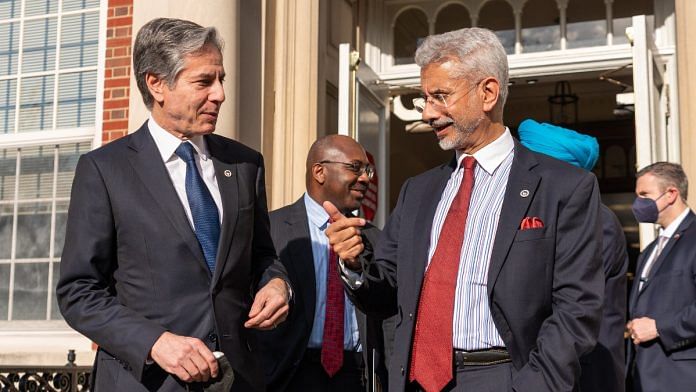The virtual summit between Prime Minister Modi and US President Joe Biden and the 2+2 dialogue was more than a routine affair. It drew the attention of the world, especially those who are direct or indirect stakeholders in the Russia-Ukraine conflict and its likely fallout.
For India, it was important to convey to the US, and to the rest of the world, that New Delhi attaches utmost importance to upholding the territorial integrity and sovereignty of nations while conducting trade or foreign policy. India’s projects in developing countries and developmental assistance are strictly within these parameters. Naturally, New Delhi expects similar reciprocal parameters from powers that deal with India. During the virtual meeting with Biden, PM Modi also reiterated India’s condemnation of the civilian deaths in Bucha as a result of indiscriminate bombing and called for independent investigation.
Both India and the US appear to be on the same page as far as the conflict is concerned and want de-escalation and peaceful resolution through talks. But on the ground, reality seems to be different. It is important to provide humanitarian relief to the civilians who have been unfortunately drawn into the vortex of the conflict. India has been at the forefront of providing humanitarian assistance to Ukraine and will continue to do so.
As for the US, its commitment and actions seems to be prolonging the war instead of ending it. Briefing the media, Pentagon press secretary John F. Kirby said on Wednesday, “We committed from the very beginning, even before the invasion, to helping Ukraine to be able to defend itself.” According to reports, President Biden had announced in March that the US will be sending an $800 million security assistance package comprising additional military weapons systems, vehicles, and munitions to Ukraine. The latest arms transfer is said to include 11 Mi-17 helicopters that the administration had originally planned for Afghanistan and 18 155 mm Howitzers, 300 Switchblade drones, 200 M113 armoured personnel carriers, and 100 armoured high-mobility multipurpose wheeled vehicles. This is no way of ensuring peace and New Delhi clearly differs from the White House on this ‘conflict escalation process’.
Also read: India-US forging tech alliance since long. Now use 2+2 dialogue to push it further
US strategy shift under Biden
The Barack Obama administration had envisioned a stable and diversified security order “in which countries pursue their national objectives peacefully and in accordance with international law and shared norms and principles including the peaceful resolution of disputes”. The Donald Trump administration emphasised on ‘America First’ and initiated a “trade war” with China. This was the time when New Delhi underlined the importance of ensuring peace and progress in the Indo-Pacific region and free, open and inclusive maritime order.
It is an enigma that the Biden administration has revived the spectre of the Cold War by upgrading Russia as ‘enemy number one’ and relegating the “not-so-peaceful’ rise of China to the background. This approach of the White House clearly indicates the changed priorities of the Biden administration. The US appears to have given up its resolve to carry on its war on terror, India-US cooperation on counter terrorism mechanisms, strengthening strategic partnership on maritime security and consolidate cooperation among democracies so as to leverage their capabilities to build a network of like-minded countries to ensure a rule-based regional and global order.
The US has to accept the changed ground realities and prepare itself to work with democracies like India in a multilateral framework. The global institutions have either been rendered ineffective or unresponsive to change and newer challenges.
Also read: India is watching the Russia-Ukraine war. And Biden is watching Modi
Where Delhi ought to keep its focus
In these circumstances, New Delhi has to reset its priorities and deal with the turmoil in the region, especially the immediate neighbourhood. Instead of building a stronger coalition with India and the Quad, the White House ‘threatened’ New Delhi with sanctions, raked up alleged human rights issues and embarked on a path of ‘arm twisting’, overlooking the fact that New Delhi is under a much stronger government. India is under no obligation to answer allegations based on hearsay and motivated anti-propaganda.
External Affairs Minister S. Jaishankar is a seasoned diplomat and it is not expected of him to indulge in verbal duel with a visiting dignitary or his counterparts anywhere in the world especially when they are putting forth their point of view. But when pushed beyond a tolerable limit, the EAM demonstrated that he can excel himself in giving the US a fitting repartee.
The larger issue is not what the US officials say about their impression of the human rights violations in India. The issue on hand is the Russia-Ukraine conflict, the human rights violations in Xinjiang and China-occupied Tibet, the Pakistan Army’s atrocities in Balochistan under pressure from Beijing to bulldoze the CPEC project, attacks on unarmed civilians, collateral damages which could have been avoided and more importantly the need for restraint on the part of Russia.
Thankfully, what began as arm twisting has ended in shaking of hands as the final outcome of the summit is the reiteration of the mutual commitment to strengthen the India-US strategic partnership in the best interests of the region and the global order.
The author is the former editor of ‘Organiser’. He tweets @seshadrichari. Views are personal.
(Edited by Prashant)



